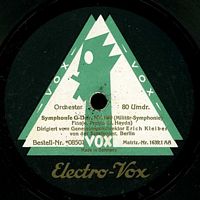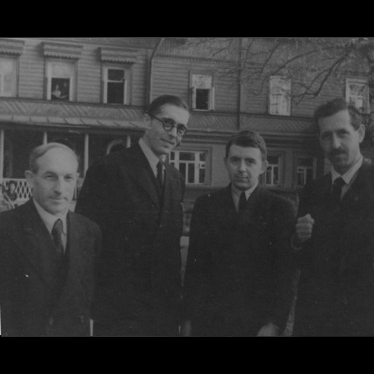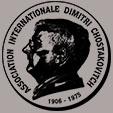Étiquette : Wiener Oktett
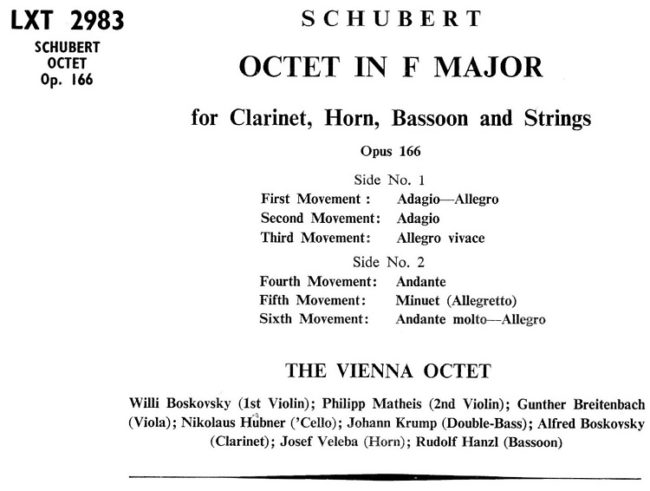
Willi Boskovsky Violine I, Philipp Matheis, Violine II; Günther Breitenbach, Bratsche;
Nikolaus Hübner, Cello; Johann Krump Kontrabass;
Alfred Boskovsky, Klarinette ; Josef Veleba, Horn ; Rudolf Hanzl, Fagott
Schubert Oktett Op.166 D.803
Enregistrement /Recording: Wien Musikvereinsaal – 26 & 27 April 1954
Pr: Victor Olof; Eng: Cyril Windebank
Source 33t/LP: Decca LXT 2983
‘Wenn man Schubert gehört hat, kann einem nichts Gescheites mehr einfallen’
(Richard Strauss)
L’Octuor de Vienne (Wiener Oktett) a joué cet Octuor en public un grand nombre de fois et il l’a enregistré à plusieurs reprises.
Si on s’en tient à la formation d’origine dont Willi Boskovsky était le premier violon, on a:
1- Genève (Studio Radio) – Juillet 1948
2- Wien Musikvereinsaal – 26-27 avril 1954
3- Wien Sofiensaal – 20-29 mars 1958
L’enregistrement 78 tours de 1948 n’a pas été réédité, de même que l’enregistrement mono de 1954, au bénéfice de l’enregistrement de 1958 qui a l’avantage de la stéréo.
Au cours de l’année 1948, les musiciens du Wiener Oktett et du WPO ont eu l’occasion de se produire lors de deux concerts à Montreux en présence de deux auditeurs prestigieux, Richard Strauss et son épouse Pauline de Ahna, qui y résidaient alors.
Le premier a été donné à la Kursaal le 30 avril 1948 par le Wiener Oktett avec au programme le Septuor de Beethoven et l’Octuor de Schubert (annonce dans le ‘Journal de Montreux’ du 29 avril 1948):
 Richard Strauss était assis au premier rang d’orchestre et il a tout particulièrement apprécié l’exécution de l’Octuor de Schubert. Quand il s’est rendu dans la loge des musiciens à la fin du concert, ceux-ci lui ont demandé s’il ne pouvait pas composer une œuvre pour son ensemble. Mais Richard Strauss leur fit signe que non et leur dit alors la phrase en exergue: ‘Quand on a entendu Schubert, rien de bien valable ne peut plus venir à l’esprit’.
Richard Strauss était assis au premier rang d’orchestre et il a tout particulièrement apprécié l’exécution de l’Octuor de Schubert. Quand il s’est rendu dans la loge des musiciens à la fin du concert, ceux-ci lui ont demandé s’il ne pouvait pas composer une œuvre pour son ensemble. Mais Richard Strauss leur fit signe que non et leur dit alors la phrase en exergue: ‘Quand on a entendu Schubert, rien de bien valable ne peut plus venir à l’esprit’.
Un peu plus tard, le 5 juin, les Wiener Philharmoniker (WPO) ont, au cours d’une courte tournée en Suisse sous la direction de Furtwängler, donné un concert à Montreux, dans la Salle du Pavillon. Le programme publié à l’avance comprenait: Mozart Sérénade ‘Gran Partita’ K.361; Schubert Symphonie n° 8 ‘Inachevée’ et Beethoven Symphonie n° 3. En raison de la présence de Richard Strauss dans la salle, son ‘Don Juan’ a été joué à la place de la Symphonie de Schubert.

Dans le Journal de Montreux du 7 juin, on pouvait lire: ‘Nous avons parfois dans un concert, l’impression que l’interprétation d’un certain morceau représente l’interprétation type, idéale, de ce morceau, celle qui le réalise avec adéquation. Eh bien, Furtwängler nous a semblé donner une telle interprétation de ‘Don Juan’. Peut-être que Richard Strauss partage notre avis, lui qui assistait au concert, et que la foule enthousiaste a applaudi en même temps que Furtwängler.’
Et en effet, à la fin du concert, le compositeur alla dans sa loge pour en remercier Furtwängler*, très touché. Frau Strauss dit alors à son mari: ‘Aussi beau que ça, je ne l’ai jamais entendu de ta part’ (‘So schön habe ich das von dir noch nie gehört’). Et Strauss de répliquer: ‘Bon, mais ce n’est tout de même pas lui qui l’a composé!’ (‘Na ja, dafür hat er‘s net komponiert!’).
Fin novembre et début décembre 1947, Furtwängler et treize instrumentistes à vents du WPO ont enregistré la Gran Partita’ de Mozart. En juillet 1948, le Wiener Oktett a mis en disques l’Octuor de Schubert. On peut imaginer que ces deux enregistrements restituent des interprétations proches de ce que Richard Strauss a pu écouter en concert à Montreux. Pour l‘œuvre de Schubert, en attendant une réédition souhaitable de l’enregistrement de 1948, on peut apprécier la très belle version de 1954, fort bien captée.
* Ce ne fut pas leur seule rencontre. Le couple Strauss a résidé au Montreux Palace de septembre 1947 à mai 1949, et Furtwängler qui habitait à Clarens est parfois venu leur rendre visite en voisin.
______________________________
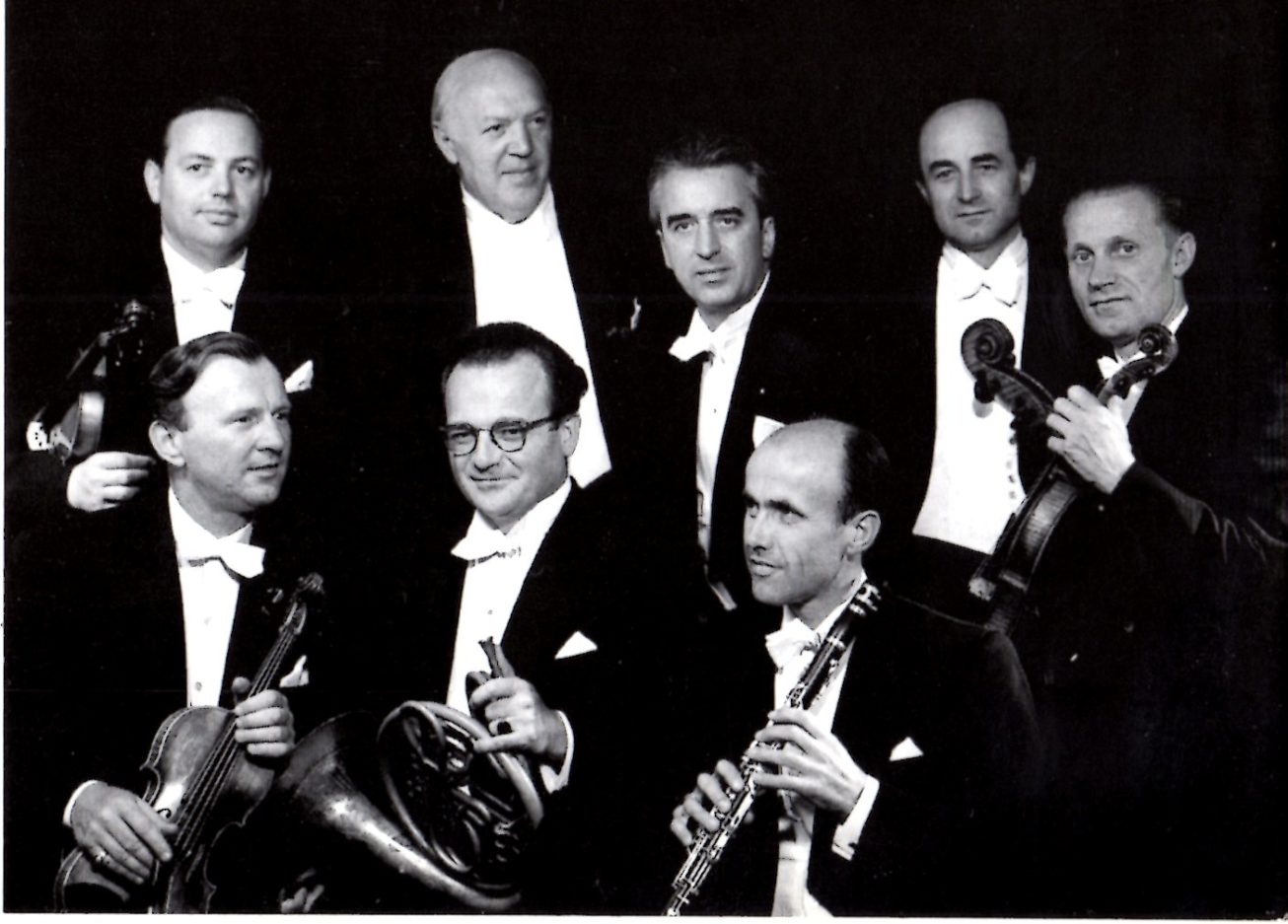
Wiener Oktett
Premier Rang /First Row: Willi Boskovsky; Josef Veleba; Alfred Boskovsky
Deuxième Rang/Second Row: Philipp Matheis; Johann Krump; Rudolf Hanzl; Nikolaus Hübner; Günther Breitenbach
______________________________
The Vienna Octet (Wiener Oktett) performed Schubert’s Octet many times and recorded it several times.
With the original members, with Willi Boskovsky as first violin, we have:
1- Geneva (Studio Radio) – July 1948
2- Wien Musikvereinsaal – 26-27 April 1954
3- Wien Sofiensaal – 20-29 March 1958
The 1948 78rpm recording has not ben re-issued, nor the 1954 mono recording, unlike the 1958 version that benefits from stereo.
In 1948, the musicians from the Wiener Oktett and from the WPO had the opportunity of playing during two concerts in Montreux before two celebrated spectators, Richard Strauss and his wife Pauline de Ahna, who were then living there.
The first was given at the Kursaal on 30 April 1948 by the Wiener Oktett and the program was Beethoven’s Septet and Schubert’s Octet (announcement in the ‘ Journal de Montreux’ of 29 April 1948):
Richard Strauss sat in the first row and he was particularly delighted by the performance of Schubert’s Octet. As he went to the musicians’ dressing-room at the end of the concert, they asked him whether he could compose a work for their ensemble. But Richard Strauss shook his head and then said the above-cited words: ‘When one has heard Schubert, nothing clever may come to the mind any more’.
Somewhat later, on 5 June, the Wiener Philharmoniker (WPO), during a short Swiss tour conducted by Furtwängler, gave a concert in Montreux, in the ‘Salle du Pavillon’. The program that was published in advance was comprised of: Mozart Serenade ‘Gran Partita’ K.361; Schubert’s Symphony n° 8 ‘Unfinished’ and Beethoven’s Symphony n° 3. Because Richard Strauss attended the concert, his ‘Don Juan’ was performed instead of Schubert’s Symphony.

In the 7 June edition of the ‘Journal de Montreux’, one read: ‘ In a concert, we have sometimes the impression that the interpretation of a given piece represents the reference, the ideal interpretation of that piece, that is the adequate rendering. Well, Furtwängler seemed to us to have given such an interpretation of ‘Don Juan’. Perhaps Richard Strauss shares our view, he who attended the concert, and who was applauded by the enthusiastic crowd, at the same time as Furtwängler.’
And indeed, at the end of the concert, the composer went to his dressing-room to thank for it Furtwängler*, very moved. Frau Strauss then said to her husband: ‘As beautiful as this, I have never heard from you’ (‘So schön habe ich das von dir noch nie gehört’). Then came Strauss’ reply: ‘Well, however, he is not the one who composed it!’ (‘Na ja, dafür hat er‘s net komponiert!’).
At the end of November and the beginning of December 1947, Furtwängler and thirteen wind players from the WPO recorded the ‘Gran Partita’ by Mozart. In July 1948, the Wiener Oktett committed to disc Schubert’s Octet. One may imagine that these two recordings reproduce interpretations close to what Richard Strauss heard live in Montreux. For the Schubert work, while awaiting a desirable re-issue of the 1948 recording, one may appreciate the very good 1954 version, very well recorded.
* This was not the only time that they met. Strauss and his wife lived at the ‘Montreux Palace’ from September 1947 to May 1949, and Furtwängler who lived in Clarens came sometimes as a neighbour to pay them a visit.

A la demande amicale d’un habitué de ce blog / At the request of a friend of this blog:
Mozart Divertimento n°15 en si bémol majeur K.287 « Zweite Lodronische Nachtmusik »
Wiener Oktett: Willi Boskovsky, Violine I; Philipp Matheis, Violine II;
Günther Breitenbach, Bratsche; Johann Krump, Kontrabass;
Josef Veleba & Josef Lackner, Horn
Wien Musikverein Brahmssaal – 4-7 April 1955
Pr: Victor Olof & Peter Andry; Eng: Cyril Windebank
Source: 33t/LP: London LL 1239
Violon I: Willi Boskovsky (1908-1991) « Stimmführer » des Violons I de 1934 à 1938, puis Konzertmeister de 1938 à 1970; Violon I du Wiener Oktett de 1947 à 1959
Violon II: Philipp Matheis (1918-1975) « Stimmführer » des violons I de 1954 à 1958, puis de 1968 à 1974; Violon II du Wiener Oktett de 1947 à 1968
Alto: Günther Breitenbach (1911-1992) « Stimmführer » de 1958 à 1977; membre du Wiener Oktett de 1947 à 1972
Contrebasse: Johann Krump (1889-1974) « Stimmführer » de 1938 à 1951 Contrebasse solo de 1951 à 1955; membre du Wiener Oktett de 1947 à 1964
Cor I: Josef Veleba (1914-1997) Cor solo de 1940 à 1968; 3ème Cor de 1968 à 1971, puis 4ème Cor de 1971 à 1977; membre du Wiener Oktett de 1947 à 1967
Cor II: Josef Lackner (1908-1996) 4ème Cor de 1941 à 1942, puis 2ème Cor de 1942 à 1973
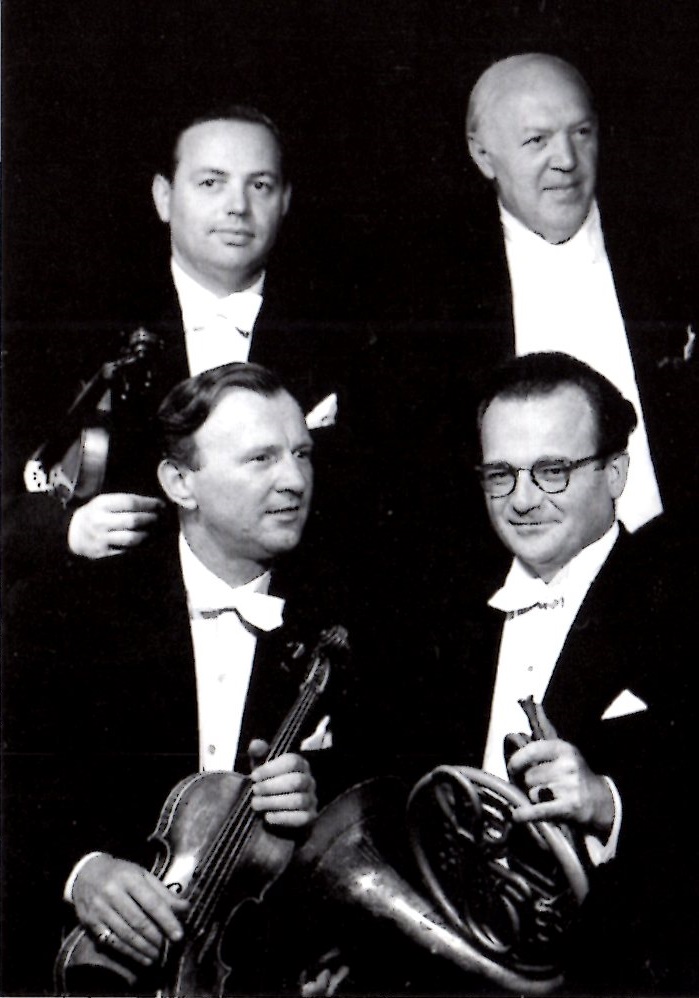
1er rang/First row: Willi Boskovsky & Josef Veleba / 2ème rang/Second row: Philipp Matheis & Johann Krump
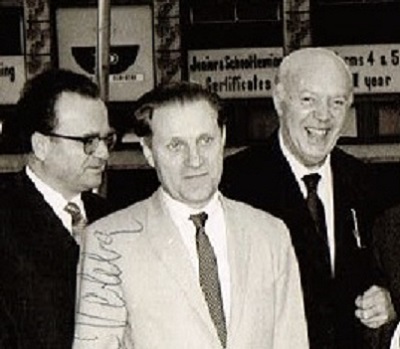
Josef Veleba, Günther Breitenbach & Johann Krump (Johannesburg 1962)
Ce Divertimento, écrit à l’origine pour un sextuor (2 violons, alto, contrebasse et 2 cors), est le plus souvent joué dans une version orchestrale, et bien qu’il en existe des enregistrements sous la baguette de chefs mozartiens reconnus (Walter, Toscanini, Karajan, Münchinger, Vegh etc…, sans oublier Willi Boskovsky et son Wiener Mozart Ensemble), la version de musique de chambre reste de loin préférable.
Et ici, son interprétation par des musiciens fondateurs en 1947 du Wiener Oktett, dans un style proche de la musique populaire, convient particulièrement à cette œuvre qui utilise deux thèmes favoris du public: « Heissa, hurtig, ich bin Hans » (« Allez, hop-là, je suis Hans ») dans l’Andante grazioso con Variazioni (II) et, avec beaucoup d’humour, « D’Bauerin hat d’Katz verlor’n » (« La fermière a perdu son chat ») dans le dernier mouvement (VI).
Si on parle beaucoup à propos de la musique de cette époque d’interprétations historiquement informées, il s’agit d’une logique musicologique qui, pour rigoureuse qu’elle soit, n’est pas forcément plus pertinente que la tradition d’interprétation issue en ligne directe de la musique populaire et illustrée ici par des musiciens du plus grand orchestre d’Autriche.
Cette version de 1955 qui n’existe qu’en mono a été publiée en 1956 à l’occasion du bi-centenaire de la naissance de Mozart (puis en 1957), mais, comme le Wiener Oktett a enregistré une nouvelle version stéréophonique en 1962 (avec comme premier violon Anton Fietz qui a succédé en 1959 à Willi Boskovsky), ces microsillons n’ont jamais été ré-édités. Les reprises ultérieures sont un CD paru au Japon en 1999 (POCL4638) et le double Album Decca Eloquence paru en 2011 (4804328).
La première tentative recensée d’une prise de son stéréophonique à Vienne par Decca a suivi immédiatement cet enregistrement. Il s’agit de l’ « Eroïca » de Beethoven avec le WPO sous la direction d’Erich Kleiber, captée à la Musikvereinsaal du 11 au 14 avril 1955, avec les mêmes producteurs et comme ingénieurs du son Cyril Windebank et Gil Went pour la mono, et Roy Wallace pour la stéréo. En raison du résultat jugé insatisfaisant, la bande stéréo a malheureusement été effacée.
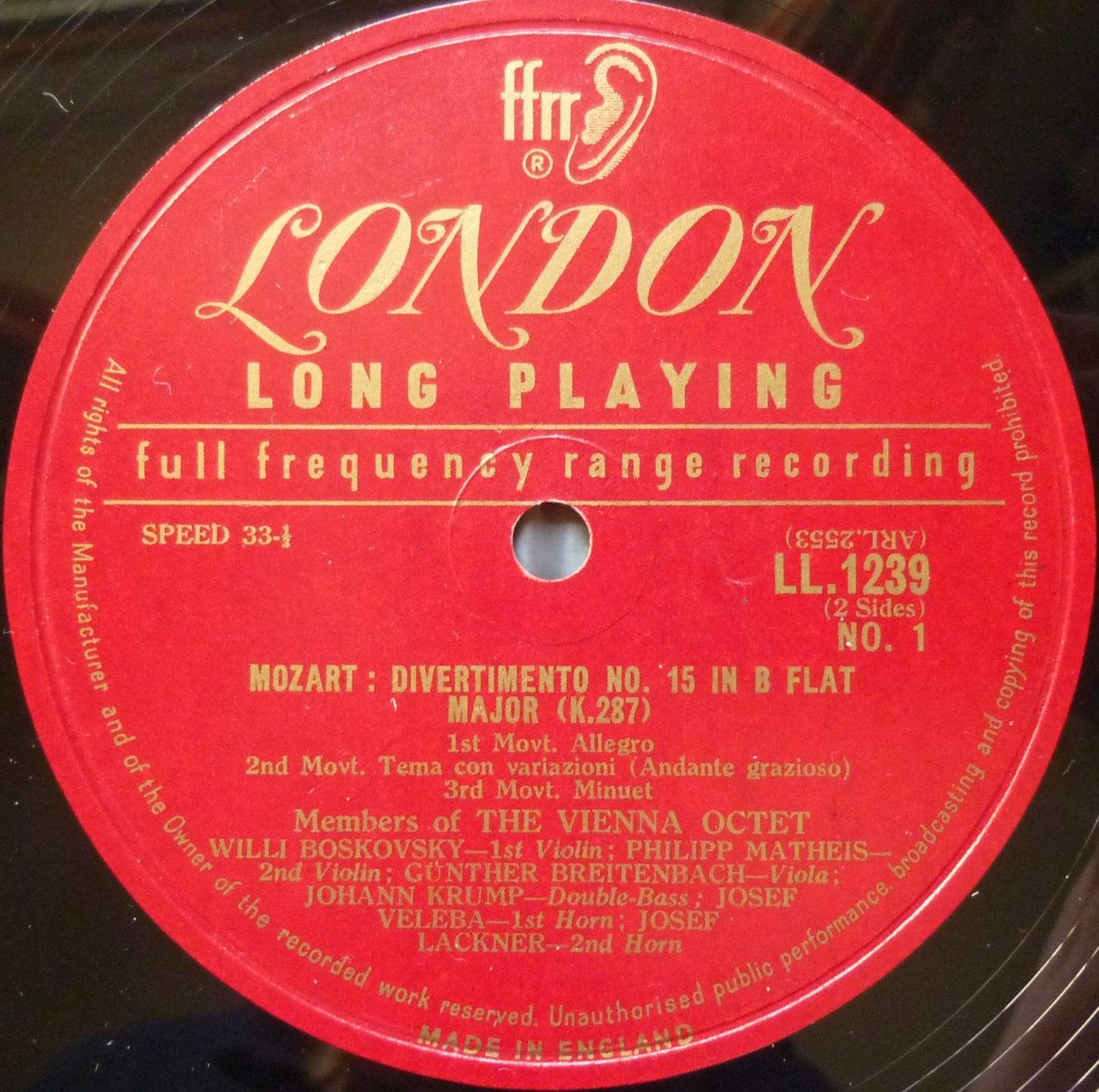
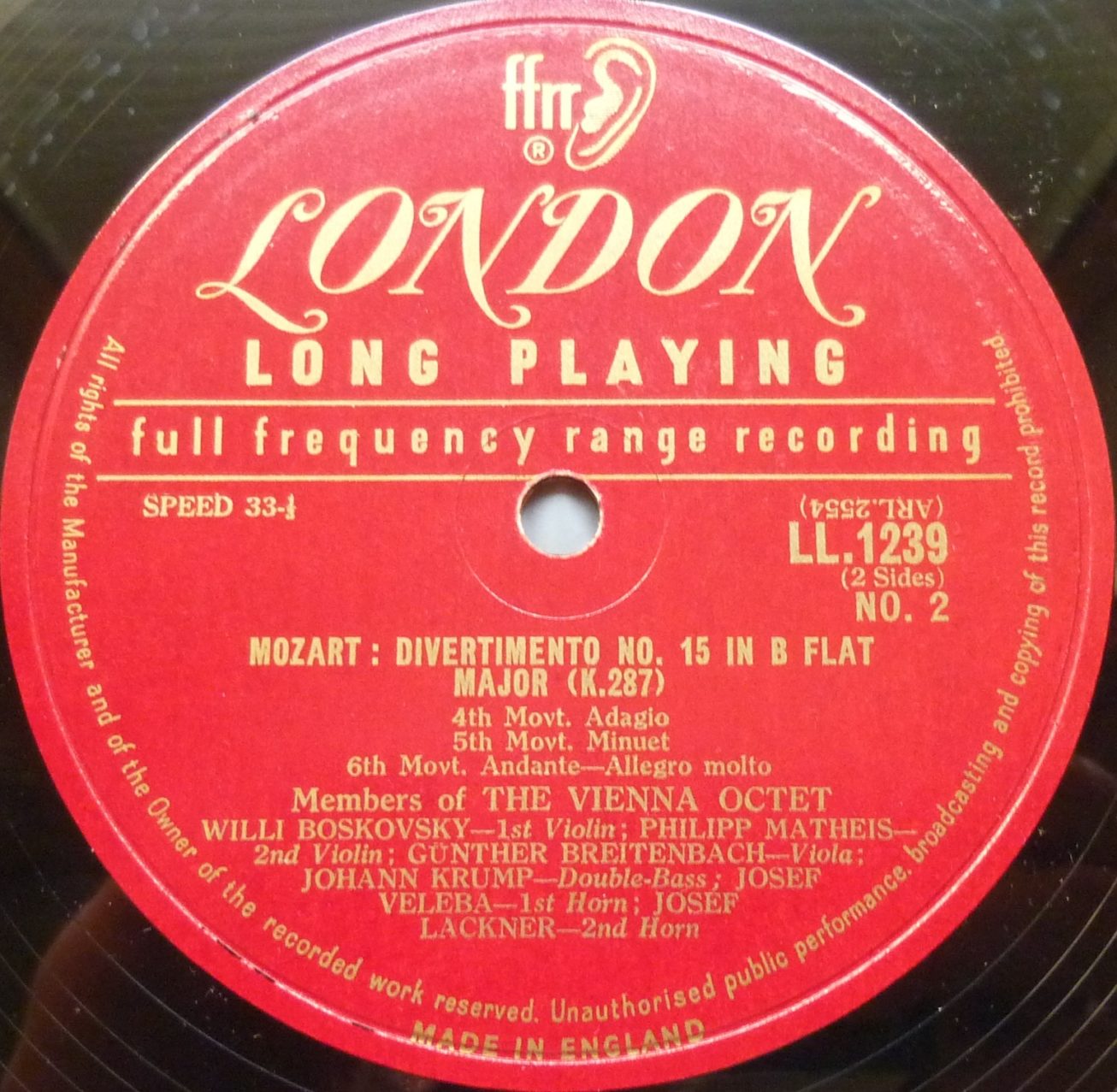
Mozart Divertimento n°15 in B flat major K.287 « Second Lodron Nightmusic »
Wiener Oktett: Willi Boskovsky, Violine I; Philipp Matheis, Violine II;
Günther Breitenbach, Bratsche; Johann Krump, Kontrabass;
Josef Veleba & Josef Lackner, Horn
Wien Musikverein Brahmssaal – 4-7 April 1955
Pr: Victor Olof & Peter Andry; Eng: Cyril Windebank
Source: 33t/LP: London LL 1239
Violin I: Willi Boskovsky (1908-1991) « Stimmführer » of Violins I from 1934 to 1938, then Konzertmeister from 1938 to 1970; Violin I of Wiener Oktett from 1947 to 1959
Violin II: Philipp Matheis (1918-1975) « Stimmführer » of Violins I from 1954 to 1958, then from 1968 to 1974; Violin II of Wiener Oktett from 1947 to 1968
Viola: Günther Breitenbach (1911-1992) « Stimmführer » from 1958 to 1977; member of Wiener Oktett from 1947 to 1972
Double-bass: Johann Krump (1889-1974) « Stimmführer » from 1938 to 1951, soloist from 1951 to 1955; member of Wiener Oktett from 1947 to 1964
Horn I: Josef Veleba (1914-1997) solo Horn from 1940 to 1968; 3rd Horn from 1968 to 1971, then 4th Horn from 1971 to 1977; member of Wiener Oktett from 1947 to 1967
Horn II: Josef Lackner (1908-1996) 4th Horn from 1941 to 1942, then 2nd Horn from 1942 to 1973
This Divertimento, originally written as a Sextet (2 violins, viola, double-bass and 2 horns), is generally performed in its orchestral version, and although it has ben recorded by notable mozartian conductors (Walter, Toscanini, Karajan, Münchinger, Vegh etc…, without forgetting Willi Boskovsky and his Wiener Mozart Ensemble), the chamber music version remains by far preferable.
And here, its performance by founding members in 1947 of the Wiener Oktett, in a style close to popular music is especially relevant for this work using two folk songs: « Heissa, hurtig, ich bin Hans » (« Hello, go on, I am Hans ») in the Andante grazioso con Variazioni (II) and, with much fun, « D’Bauerin hat d’Katz verlor’n » (« The farmer has lost her cat ») in the last movement (VI).
If much is said about historically informed performances concerning music of that period, this has to do with a musicological approach, which though serious-minded, is not necessarily more relevant than the performing tradition directly coming from popular music and illustrated here by musicians of the greatest orchestra in Austria.
This 1955 version which exists only in mono was published in 1956 for the Mozart year (and also in 1957), but, as the Wiener Oktett recorded a new stereophonic version in 1962 (with as Violin I Anton Fietz who replaced Willi Boskovsky in 1959), these LPs have never been re-issued. The later publications are a CD published in Japan in 1999 (POCL4638) and the 2-CD Album « Decca Eloquence » published in 2011 (4804328).
The first attempt by Decca in Vienna of a stereophonic recording came immediately after this recording. It was Beethoven’s « Eroïca » with the WPO conducted by Erich Kleiber, at the Musikvereinsaal between April 11 to 14, 1955, with the same producers and as recording engineers Cyril Windebank et Gil Went for mono, and Roy Wallace for stereo. However, since the result was considered as being insufficient, the stereo tape has been unfortunately erased.

